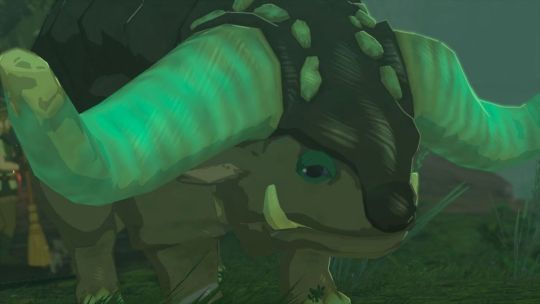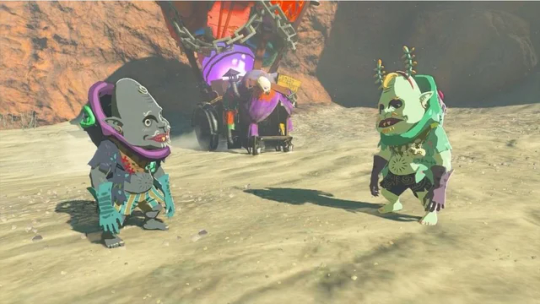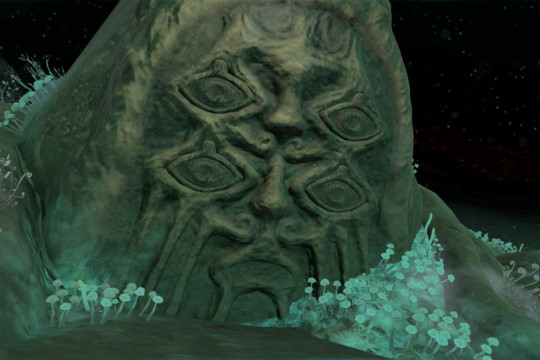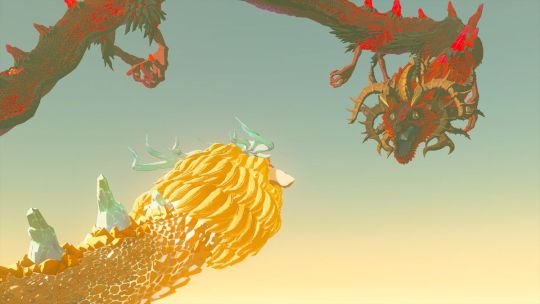#and that morality was initially more a topic in TotK because.... the traces do seem to remain
Text
The Dondon Post (or: the bizarre TotK's side content counterpoints to its main quest's immuable binary morality)
Speaking of strange TotK Choices, I think I have one singe post left in me about this game; and it's about the Dondon quest, "The Beast and the Princess".
(and about other stuff too, you'll see, we'll get to them)
More specifically: about how... strange of a thematic point it feebly attemps to make in the larger context of the storyline, and how it seems to be yet another mark of a world that, perhaps, once tried to be more morally complex that it ended up becoming.
Buckle up: it's a long one, and it gets pretty conceptual.

(good gem boys notwhistanding)
The Princess and the Beast
So, a couple of things about the setup. We are investigating potential Princess sightings; but at this point, either because we have already completed a bunch and know the general gib, because we have met a couple of wild Fake Zelda shenanigans, or through the simple fact that we are completing a side quest, we know there's a good chance it won't lead to an actual Zelda information. So when we ask Penn about what is going on and he replies with the ominous "we saw the Princess riding some kind of beast --a frightening one with huge, brutal tusks-- that the princess seemed to control", we get Ideas. Then the sidequest is registered: "The Princess and the Beast".
So. You know me. And if you don't know me, here's what you should know: my brain immediately flared up with the thought there was no way in hell this wasn't some kind of wink towards Ganondorf's renowned boarish beast form, especially given tusks were given so much focus.
My first assumption was: that's a miniboss right? I will get to fight some small boar-like thing that Fake Zelda rides sometimes. Cool! I didn't hold too hard onto my hope that the relationship of Zelda and/or Ganondorf to the natural world, or to each other would be expanded upon, since I had already been burned before, but my interest was piqued.
You have to understand how starved I was for any hint of complexity or mystery or ambiguity at this point. I was extremely eager for the game to throw anything at me that would surprise me, enlighten something pre-established, make the exploration lead to a meaningful discovery or deepening of characters, world or themes (and not just slightly cooler loot, or a bossfight, or a puzzle devoid of emotional context --cohesion and depth is what motivates my play sessions, especially in an open world game that I want to believe is worth losing oneself into). This was about the most intriguing task on my to do list at the moment, and so I plunged in immediately.
After really REALLY misunderstanding what I was supposed to do (I stalked every corner of every forest surrounding the tropical area at night or during blood moons in hope to see something --which was very much the wrong call), I arrived to the other stable, then was guided to the other side of the river where Cima awaits and explains that these creatures are actually a new species discovered by Zelda; that they are gentle and kind and not at all scary ("Dondons aren't beastly, they're adorable!"), and even somehow digest luminous stones into gemstones. They like the company of people and liked Zelda in particular.
I was... I felt two different ways about this conclusion, and I think it's worth to explore both: disappointment and some sort of... "huh!" Hard to describe this emotion otherwise.
I'll get the disappointment out of the way first, because it's the least interesting of the two. While I think the little emotional arc I was taken on was not devoid of interest --I was indeed taken on by the rumor and intrigued by its implications-- I wanted, well. A little bit more. And if the creatures were to be Zelda's pet project, I would have loved for them to be actually terrifying and feisty, and for her to develop an interest for these creatures in particular regardless. It could have been very interesting characterization that veered out of the perfect princess loving the perfect world floundering around her, always bringing her clear, practical benefits from the interaction.
(I have made another post that speaks of my discomfort that Zelda does everything everywhere and everyone loves her for it --I get what they were trying to go for, but it either lacks conflict for me to buy into that dynamic at the scale of several regions, or they went on too hard for my taste, as she is, at once and in the span of a couple of years at most: a schoolteacher, a gardener, an animal researcher, a scholar, a traveler, a military expert, a knower of landscape, a painter, a horse rider, an infrastructure planner, a [...] princess --at some point it begins to sound made up, "Little Father of the people"-esque to rattle the hornet's nest a little bit, especially if it's not shown as either a clearly godly characteristic or, even more necessary imo, a negative trait; another expression of her killing herself at work to compensate for a perceived flaw she's trying to earn forgiveness for, like she did in BotW. But that's another topic, and the clumsiness of her character arc has been well threaded by basically everybody disappointed in the story already.)
But, if I decide to be a little graceful, I'd like to explore my "huh!" emotion, and take it apart a little bit.
I think there's something interesting to have such strong parallels to setting up a story about the relationship between Zelda and Ganondorf ("The Princess and the Beast", like come on guys that's the conflict of over half the series), or at least Zelda and the concept of Evil since Ganondorf pretty much represents it in this game, and then have it go: actually, there was a horrible monster that everyone was afraid of, but Zelda was wise and patient enough to approach it and realize its potential beyond the tusks, what beauty can be brought upon the world if one makes the effort to look for what exists underneath. It says something a bit deeper about the world and about Zelda in particular. It intrigues, at the very least.
Is it a reach? Probably! Is my first interpretation that the quest is actually about "eww you thought Zelda would be interested in *disgusting vile monsters* and not sweet and gentle and human-loving animals that literally shit jewlery when cared for? jokes on you, she never would feel any ounce of sympathy for anything that isn't Good and Deserving" uhhh definitively truer? Probably! But I also don't want to dismiss that the quest made me think about it. If I had completed it earlier, I might have even felt like it was (very clumsy, not gonna lie) setup about the main conflict.
But that's also a good segway into my next section: the arbitrary limitations between the animal and the creature, the monstrous and the human.
And the fact that TotK points directly at it.
A Monstrous Collection

(these two guys are just. doing So Much and being So Valid despite being massive weirdos the game wants us to be slightly repelled by. I, for one, respect the Monster kinning grind and their general Twilight Princess energy.)
So. These two guys. There is so much to say about these two guys. I don't think I have seen the Trans Perspective on Kolton on tumblr, and I would love to get it because. I feel like it's a worthwhile discussion (just, how gender and identity is handled in TotK overall, I feel like it's a very complicated conversation and I have not seen super deep dives and I'd be very interested in hearing more).
Beyond the throughline of voluntary consumption of magical objects to turn into less human creatures being a weirdly prevalent plot point in TotK (Zelda, Kolton and Ganondorf casually transing their entire species for funsies --Ganondorf being particularly relentless with Fake Zelda, mummy/phantom shenanigans, Demon King and then literal dragon), I want to focus on Kilton a little bit.
Kilton is genuinely the only NPC in the game willing to acknowledge the inherent personhood that monsters have (the game does showcase them picking up fruits, mourning their boss if you kill them, being cutesy and happy to identify you as one of their own if you wear the appropriate mask --and that's not even getting into creatures like the Lynels, who seem to really edge on the limit of being a conscious creature with a system of honor and property and many other things). He does encourage us to think of monsters as more than a species whose only worth lie in how fun it is to eradicate them; even more, gameplay-wise, he does give us a reason to interact with them in other ways than just our sword with his museum. He does encourage us to see that beauty for ourselves and then select what we think is coolest/most intimidating/cutest/eight billion ganondorfs in every pose imaginable
The fact that Ganondorf is considered a monster was a great win for this feature in particular, and is very funny, but it's also... A lot, if we dig at it a little more than warranted. Beyond all of the Implications and all of the things of representation and political conflict and values already discussed ad nauseum: when did he stop being considered a human? What does that mean about the flimsiness of what is a monster and what is a creature and what is an animal and what is a person and what is even a hylian, as sheikahs got absorbed into the definition in this game? Especially with the stones taken into account, how profound changes in nature are a huge part of the plot (even when reversed and ultimately pretty meaningless): how easy it is, to make that slip? Who decides when that slip has been made? What is acceptable to hurt without remorse? What is beautiful and worth preserving? What is both at once? What is neither?
And again, in a classic Zelda conundrum (appreciative(?)): who the fuck gets to decide that, when, and why?
The Bargainers and the Horned God

(major shoutout to these big guys for being the sole and only providers of actual depth to the Depths, and for looking cool as heck)
So. Let's move the conversation to the Depths.
Conceptually: what an interesting idea!! And so well executed (initially)!! A mirror world to the surface, dark and hushed and full of unknown creatures; haunted by gloom and sickness and the unknown. Not a first in the series, far from it: from ALTTP to ALBW, and even taking the Twilight world of TP into account, this idea of a Dark World acting as a deforming mirror to Hyrule and revealing many interesting aspects as we get to explore both is always a very interesting take on corruption and envy and fear/weakness and/or some sense of darkness looming under the perfect exterior. I'd argue even the Lens of Truth of both OoT and MM's serve a similar function, both gameplay-wise, but also in terms of theme: not everything is as it seems. In the world of Light, darkness must hide itself; but darkness also possess its own beauty, its own hardships, and will stare back at you without blinking if you go seek for it. It's, in my opinion, one of the series' most compelling conversation about the cyclical nature of fate, the coldness of godhood, and how small one feels in the face of a universe that is more complicated than it initially appears --which is why Courage must be invoked to push forward regardless.
The Depth's otherworldly ambiance is truy wonderful, whether in the plays of light and shadows, the creatures native to the environment we meet there (wish we met more!), the soundtrack, the strange aquatic/primordial plants, the fact that the dragons visit this place and connect them to the outside --invoking ideas of balance and interconnectivity, that the tree branches look like veins. The coliseums, the mines, the zonai facilities and the prisons do seem to poke at many things about what the relationship to the past was to this place; was it ever truly a place? Did it look like this back then? Why was it buried? Why did it come back? But in spite of it all, I think the Depths struggle overall to question or reveal anything about the surface that we couldn't already assume going in (that the only thing congealing there is Ganondorf's gloom, his lonely domain of Wrongness, only shared by Kohga and the yiga --the only naysayers of Goodness and Light, contemptful and blinded by self-importance and rage). The zonite is mined by gloomy monsters --why, what for?-- so any notion of greed and over-expansion that could have been associated to the zonai is now reabsorbed into Ganondorf's general evilness, since it needs to be reminded he is everything and anything bad with the world: darkness and conquest and greed and capitalism and pollution and bad weather and sickness and darkness and violence and war and death and betrayal and fakeness and lies and patriarchy and exploitation. No matter that he never does a single thing with zonite in the game; rather set up elements of conflict that never go anywhere than, for a second, let the foundations of absolute goodness and absolute evil risk becoming shaky --and you coming to this unwelcoming dark place that hates you, killing the miners and taking their resources for yourself is, on the other holy, royal fur-covered hand, utterly legitimate. The resources were once Rauru's after all, were they not?
And this is what I would say, except... except for the dead. The fallen warriors, the poes, and, most important of all: the Bargainer statues.
The Bargainers are, in-universe, godly creatures guiding the fallen to a place of final respite, regardless of moral alignment. The poes are all, fundamentally, cleansed of judgement: they are lost souls whose past reality does not matter anymore, and all deserve that peace regardless. In spite of the heavy paradise/hell parallels drawn in that game, with Rauru/Zelda/Sonia as the guardians of Light where Ganondorf gets to become a Devil-like figure, it is confirmed here that no such thing exists when you actually die in this universe.
It almost feels as if the fabric of Hyrule itself, in a brief moment that refuses to elaborate on its own point, goes: "yeah, whatever is happening here between Light and Darkness, it doesn't actually matter. This conflict is futile and doesn't understand the real nature of being alive, dead, a god, a person, a monster, an animal. The truth lies elsewhere --but you will never be told what it is."
It's: wild.
One of the game's most striking traits of narrative brilliance in my opinion --to the point where I'm wondering whether it's there on purpose or was effectively an oversight since every other aspect of reality breaks its own back trying to reassure us that everything is at its correct place, receiving the appropriate treatment by the universe in a way that is never to be questioned.
Another case of that ambiguity being allowed to exist without being immediately crushed and repressed is the case of the Horned God (interesting parallel to Ganon's actual horns that he develops in this game in case the hellish parallels weren't clear enough already): a demon Hylia sealed into stone and pushed far from humans in a clear case of questionable behavior since, while the Horned God isn't exactly nice, does propose a different philosophy you are not punished for exploring; and yet, a proposal that has seen itself persecuted in a very real sense by the goddess of absolute goodness, patron of hylians, Zelda, and many more. Pushed away from view.
Interesting.
And Yet, Light Must Prevail

Okay, so, after all of this, we're left to ask... What the fuck is up with morality in Tears of the Kingdom?!
What do we trust? These half-breaths in the occasional sidequests that Light and Darkness is just the wrong frame of reference, that nature cannot be this simple, is ever-shifting and can be recalled or reaffirmed by arbitrary forces, and might even not matter at all in the universe's fabric, despite having so much of its lore soaking in the dychotomy? Or... everything else about the game, this insistence that Good must not only be assumed as whatever tradition the kingdom has passed down for thousands upon thousands of years, but remain utterly unquestioned the entire time? That Bad is without cause, graceless and unworthy of investment?
Are the Bargainer's statues the only thing worth listening to, that morality is a fable the living tells themselves --or should we be moved when Darkness destroys Light, when Light suffers to preserve itself and the world --but not when the Other is rightfully slain?
Was Kilton correct to see beauty in the monstrous? Was Kolton onto something when he let go of his previous form because there is no clear distinction between what should receive an arrow to the face and what shouldn't? Or should we rather focus on Zelda losing her human form as a beautiful and tragic sacrifice --but something that never actually altered her nature as a hylian, the descendant of a lineage of Good Kings meant to rule forever?
Is the Dondon good because it always was, or was it worth Zelda's love in spite of the fear it initially provoked?
Either way, at the end of the game, evil is slain. Ganondorf is, not killed, but --like his angry BotW boar counterpart-- destroyed, as monsters tend to be. He explodes over the lands of Hyrule, freed from Darkness; freed from everything wrong, since the foreign menace that embodied it all was wiped out in one fateful sweep of a holy blade cradled in sacrificial love. Nothing wrong remains. The Sages reaffirm their vows to protect the kingdom forward, and a very human --hylian-- Zelda smiles: Hyrule now forever and ever basked in eternal Light.
#totk#thoughts#tloz#totk critical#when will my brain return from the imprisoning war...#ganondorf#zelda#rauru#bargainer statue#kilton#kolton#dondon#this one gets a bit conceptual but#morality in totk is SUCH a headscratcher#I think this ambiguity is genuinely the only thing that keeps my brain interested in the subject#I am of the opinion that there was a big rewrite at some point#that severely simplified the conflict#and that morality was initially more a topic in TotK because.... the traces do seem to remain#it could also 100% be a case of developers not caring about themes at all whatsoever#and not realizing what they are saying or putting into question#but#worth pondering upon
354 notes
·
View notes